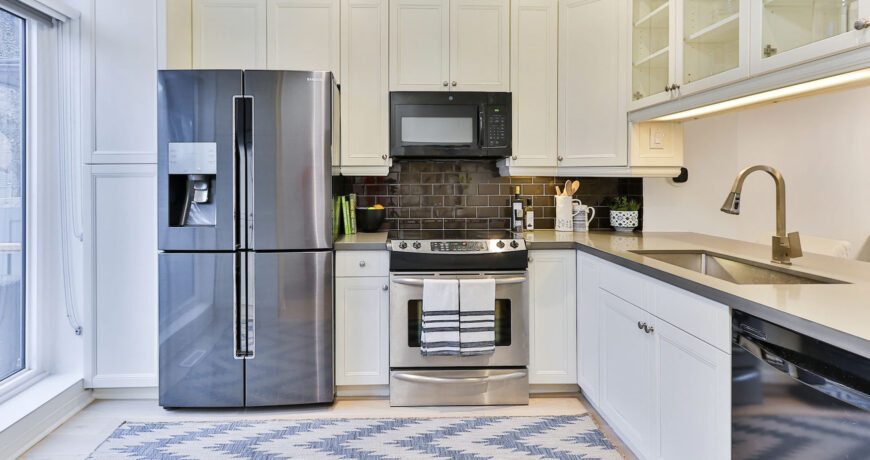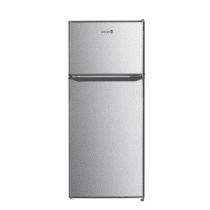How to Choose the Right Refrigerator for You
Six Important Things to Know Before Buying a Refrigerator.
The refrigerator is perhaps the most indispensable and highly valued home appliance. It’s hard to imagine getting through the day-to-day without one and finding a refrigerator that fits your evolving lifestyle can be a daunting task since it’s something you’ll likely use for many years. At Anson’s, you can explore a variety of refrigerator options from top brands like Samsung, LG, Panasonic, Sharp, Condura, Beko and others.
Whether you’re a first-time buyer or upgrading to a newer model, there are six key considerations you’ll need to consider before making your purchase.
1. Size and Capacity:
Consider the size and capacity of the refrigerator you need based on the number of people in your household and how often you grocery shop. Smaller households can go for refrigerators with a capacity of 18-22 cubic feet, while larger families may need refrigerators with a capacity of 22-30 cubic feet or more. Make sure to also think about how much freezer space you need and measure your available space to ensure that your chosen refrigerator will fit.

Keep in mind that this is just a general guideline, and your specific needs may vary depending on how often you grocery shop, how much you cook at home, and other factors. It’s always a good idea to measure your available space and consider your unique needs when selecting a refrigerator.
2. Energy Efficiency:
When choosing a refrigerator, energy efficiency should be a top consideration. Energy-efficient refrigerators can help you save money on your monthly utility bills and also reduce your carbon footprint. Here are some things to look for when shopping for an energy-efficient refrigerator:
- ENERGY STAR rating: Look for refrigerators that have an ENERGY STAR rating. This means they meet strict energy efficiency standards set by the U.S. Environmental Protection Agency. ENERGY STAR certified refrigerators use at least 20% less energy than standard models.
- Size and capacity: The size and capacity of your refrigerator can impact its energy efficiency. Larger refrigerators require more energy to cool, so if you have a smaller household, you may be able to get away with a smaller refrigerator.
- Features: Some refrigerator features can impact energy efficiency. For example, ice makers and through-the-door ice and water dispensers can increase energy usage. Consider whether these features are important to you and how they may impact your energy usage.
- Maintenance: Regular maintenance can help keep your refrigerator running efficiently. This includes cleaning the condenser coils, checking the door seals for leaks, and defrosting the freezer regularly.
- Placement: The location of your refrigerator can impact its energy efficiency. Make sure it is placed in a cool, well-ventilated area away from heat sources like ovens and direct sunlight.
By choosing an energy-efficient refrigerator, you can save money on your utility bills and reduce your environmental impact. Look for ENERGY STAR certified models and consider the size, features, maintenance, and placement of your refrigerator to maximize its energy efficiency.
Energy Efficient Refrigerators
Shop Now3. Features:
When choosing a refrigerator, it’s important to consider the features that are important to you and your lifestyle. Here are some features to consider:
Adjustable shelving: Adjustable shelves make it easier to store items of varying sizes and shapes in your refrigerator.
- Temperature control: Look for a refrigerator with temperature controls that allow you to adjust the temperature settings for the fridge and freezer compartments.
- Ice and water dispensers: Some refrigerators come with built-in ice and water dispensers. These can be convenient, but they can also add to the cost and energy usage of the refrigerator.
- Smart connectivity: Some refrigerators come with smart connectivity features, allowing you to control settings and receive alerts from your smartphone or other mobile devices.
- Air filtration: Some refrigerators come with air filtration systems that help remove odors and keep your fridge smelling fresh.
- Door alarms: Door alarms can alert you if the refrigerator door is left open for too long, helping to prevent food spoilage.
Keep in mind that additional features can add to the cost of the refrigerator, so it’s important to consider which features are most important to you and your lifestyle. Consider your daily routine and habits, and think about which features will make your life easier and more convenient.
4. Style & Design
When choosing a refrigerator, it’s important to consider the style and design that would fit your kitchen’s aesthetic. Here are some common refrigerator styles to consider:
- Top mount refrigerators: These refrigerators have the freezer section located at the top of the unit and the refrigerator compartment at the bottom. They are a common style and tend to be more affordable than other types.
- Bottom mount refrigerators: These refrigerators have the freezer section located at the bottom of the unit and the refrigerator compartment at the top. They tend to be more expensive than top-mount refrigerators but offer easier access to the refrigerator section.
- French door refrigerators: These refrigerators have two side-by-side doors that open to reveal the refrigerator section. The freezer section is located at the bottom of the unit. They tend to be more expensive than other types of refrigerators, but offer a sleek, modern look.
- Side-by-side refrigerators: These refrigerators have the freezer section located on one side of the unit and the refrigerator compartment on the other. They are a popular choice for those who want equal access to both sections.
When choosing a refrigerator style, consider the layout of your kitchen and the space available. You’ll also want to consider the finishes and colors available for each style, and choose one that matches your kitchen’s design aesthetic. Keep in mind that the style of your refrigerator can impact its cost, so be sure to consider your budget as well.
5. Brand & Reputation
When choosing a refrigerator, it’s important to consider the brand and reputation of the manufacturer. Here are some factors to consider:
- Reliability: Look for refrigerators from brands with a reputation for reliability. Check reviews and ratings from other customers to get an idea of how well the refrigerator has performed for others.
- Customer service: Consider the level of customer service offered by the manufacturer. Look for a company with a good reputation for customer service and support.
- Warranty: Check the warranty offered by the manufacturer. A longer warranty can give you more peace of mind and protection in case of any defects or malfunctions.
- Availability of parts and repairs: Consider the availability of replacement parts and repair services in your area. Choose a brand with easily replaceable parts and a network of repair services to ensure that your refrigerator can be easily serviced if necessary.
By choosing a reputable brand, you can increase the likelihood of purchasing a reliable and high-quality refrigerator. Do your research online, read reviews and ratings from other customers, and ask for recommendations from friends and family to find a brand that you can trust.
Top Refrigerator Brands in The Philippines:
- Samsung – Samsung is a well-known brand that offers a wide range of refrigerators with advanced features such as digital inverter technology, frost-free operation, and smart connectivity options.
- LG – LG is another popular brand in the Philippines that offers high-quality refrigerators with features such as inverter technology, door-mounted ice makers, and multi-air flow systems for optimal cooling.
- Panasonic – Panasonic is a trusted brand in the Philippines that offers refrigerators with advanced features such as intelligent inverter technology, AG clean filters, and energy-saving operation.
- Sharp – Sharp is a Japanese brand that offers a range of refrigerators with features such as plasma cluster ion technology, inverter compressors, and tempered glass shelves.
- Condura – is another popular refrigerator brand in the Philippines and is known for its energy efficiency and durability. Condura offers a range of refrigerators with features such as inverter technology, tempered glass shelves, and adjustable storage options.
These are just a few of the top refrigerator brands in the Philippines. Other notable brands include Whirlpool, Beko, Fujidenzo, and more. When choosing a refrigerator, it’s important to consider your specific needs and budget to find the best option for you.
6. Budget
When choosing a refrigerator, it’s important to consider your budget. Refrigerators can range in price from a few hundred dollars to several thousand dollars, depending on their size, features, and brand. Here are some things to keep in mind when considering your budget:
- Size and capacity: Larger refrigerators with more features tend to be more expensive. Consider the size and capacity you need, and choose a refrigerator that meets your needs without breaking the bank.
- Features: Consider which features are most important to you and your lifestyle. Some features, such as ice and water dispensers or smart connectivity, can add to the cost of the refrigerator.
- Brand: Some brands tend to be more expensive than others. Consider your budget and look for brands that offer high-quality refrigerators within your price range.
- Sales and discounts: Look for sales or discounts on refrigerators to save money. You may be able to find a high-quality refrigerator at a discounted price if you shop around.
Remember to also consider the long-term cost of the refrigerator, including energy usage and maintenance. A more energy-efficient refrigerator may cost more upfront but can save you money on your monthly utility bills in the long run.
By setting a budget and considering your specific needs, you can find a refrigerator that meets your needs and fits within your price range. Look for sales or discounts, and don’t forget to consider the long-term cost of the refrigerator when making your decision.
















